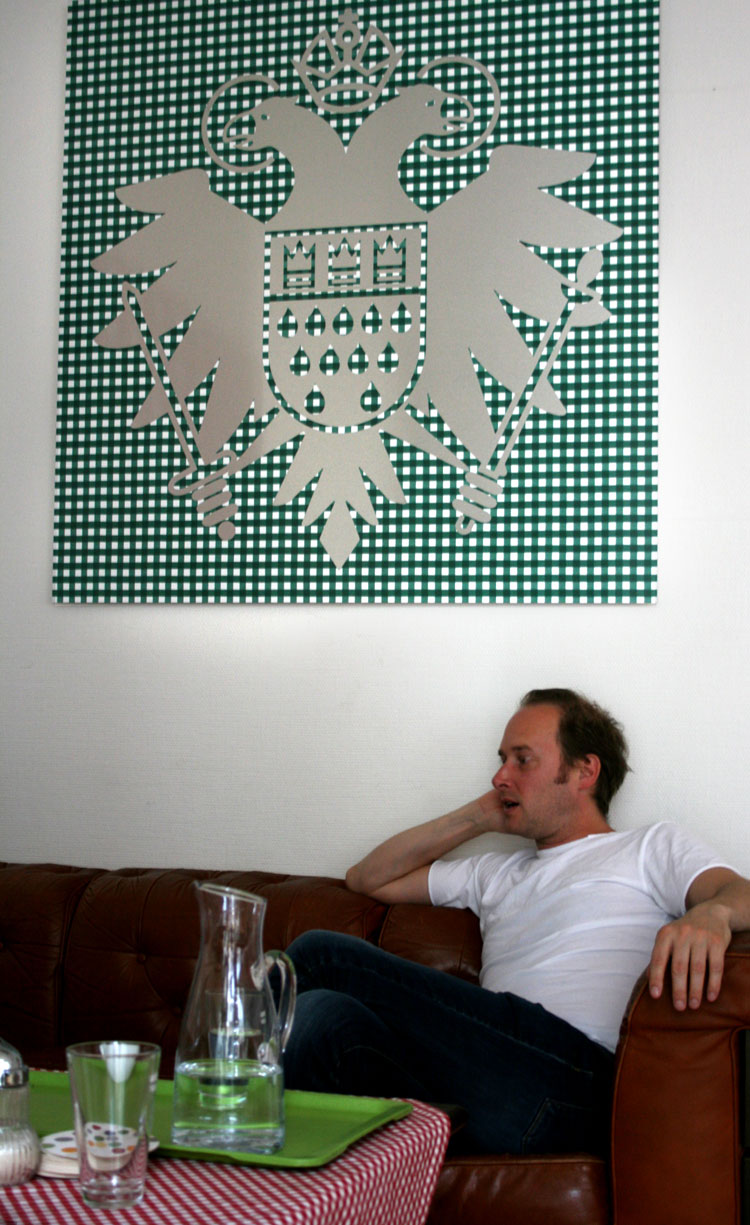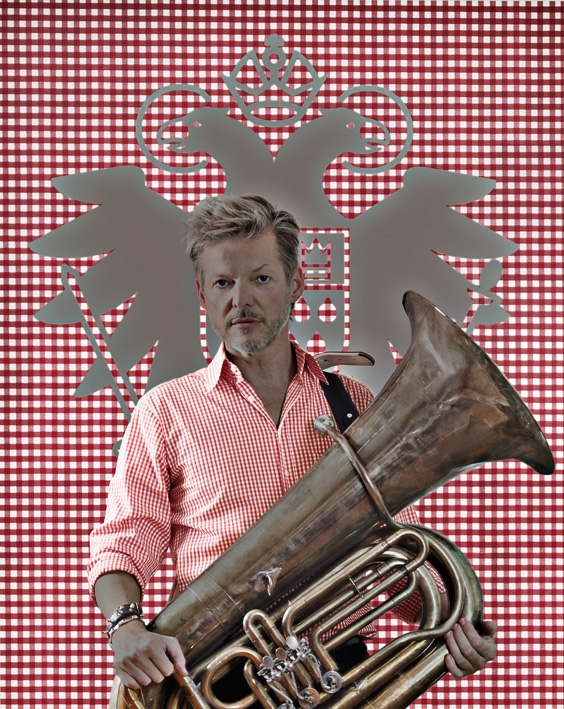"Food is very important", declares Wolfgang Voigt as we walk past the open kitchen. It is my first time in the office of Kompakt Records, situated above their record store in Cologne, Germany’s fourth city, home to over one million inhabitants. It’s 2005, and I’m writing a story on the electronic music scene in the city for the Dutch music magazine OOR. I’d been coming to Cologne since I was a little boy – I grew up in Heerlen, near the German border, just an hour’s car drive to the outskirts of Cologne – but since I left my birthplace for Amsterdam I had hardly visited Germany.
In March 2005 I had that special moment. I was going to shop for vinyl and walked from the station to Belgisches Viertel, the alternative city district. It was cold and there was a low sun, giving the city a kind of Instagram-filter atmosphere. ‘Elan’ by Justus Köhncke was playing on my headphones. And then there were shivers, butterflies, tears coming up. That moment was magic happening, and everything fell into place. Suddenly I understood Cologne. Of course ‘Elan’ was released on Kompakt, in January 2005, just one of the many fantastic records the label has put out since it started twenty years ago.
For me, Kompakt’s genre-crossing diversity has always made the label stand out – you could argue that it’s more a pop than a techno or house label. "You are absolutely right. Kompakt is pop, has always been pop," agrees Hans Nieswandt, a journalist, musician and DJ from Cologne. "The label is very good at setting an agenda – for a long time it has been dictating the aesthetic culture of pop techno."
The story of Kompakt starts in 1993, when Wolfgang Voigt and Jörg Burger founded Delirium, a Cologne branch of the Frankfurt record store. The name Kompakt was adopted in 1998, to bring structure to the numerous labels founded as part of the store. "It’s amazing that Kompakt still exists," refects Nieswandt. "Most labels that were famous in the 90s have vanished. Maybe it’s because they started at the beginning of a new music culture. Techno didn’t have a history, was changing every day and the dynamics and energy of dance culture were huge. There were new territories to explore. Don’t be mistaken: both Wolfgang and Burger were in their 30s, they knew what they were doing and had a long term vision."
Kompakt is constantly reinventing itself. "This year the label was invited for Art Cologne, one of the biggest art fairs in Europe," says Nieswandt. "Pop records as art – that is something." Indeed, according to Nieswandt, Kompakt has always been as much about aesthetics as it is about music. "It touches a nerve. The store looks like a gallery, is spacious, minimalistic. That’s not the ordinary, messy look of a record store. The design is sleek, reminding of Bauhaus and Braun, a sort of 50s futurism. If you are living in Toronto or Mexico City, these are the aesthetics of German techno."
So Kompakt is more than a store, a label and studio, it’s an idea. "It still breathes that 90s spirit of doing things together, believing in a positive future, creating something that will change the world," continues Nieswandt. "It certainly introduced a school that influenced people all over the world."
The label also played an important role in Cologne. Instead of signing everybody to the label or sub labels, it made artists start their own. The electronic music scene flourished in the 90s, spawning the term "the sound of Cologne". Despite the exodus of creative people to Berlin at the beginning of this century, Kompakt remained in their hometown. Cologne suffered. Artists, record labels, galleries and fairs moved to Berlin, and by staying Kompakt earned a lot of respect.
Since 2001 Kompakt has been based in a five storey building in the Wederstrasse, and been run by Wolfgang Voigt, Jürgen Paape and Michael Mayer. On the ground floor is the record store, while the famous Kompakt studios – four in total – are located in the basement. Offices are at floor one, kitchen and meeting rooms on the second. Hans Nieswandt tells me, tongue in cheek, that outsiders sometimes see Kompakt as some kind of cult: people who are vegetarian, non-smoking and aware of their good taste. Spending some hours in the building gave me another impression – of love and passion for music.
In the minimally furnished meeting room, Michael Mayer tries to recall memories of the early days of the label. "I lived in Cologne and worked as a DJ and was completely fed up with the dominant hip hop culture," he remembers. "I heard there was a new record shop opening and went there to check it out. I was the first customer, digging into only two crates of vinyl. I was disappointed and told them, and started nagging about all the interesting stuff that they missed."
Founders Voigt and Burger were producers, and knew they could use the help of a DJ who knew his stuff. Mayer was hired to purchase new records, becoming a partner a few years later. "We had a major storage problem," he laughs. "Especially around 1996 when the whole scene exploded and the sound of Cologne was at its peak. We got so many new records that we were afraid we weren’t able to get out at night. When we moved to this building, we knew this had the right size."
The evolution from record store to the firm that Kompakt is today has been a logical one, Mayer explains. "We started more and more labels to bring our music out, because no else wanted to. Our music was too difficult to categorise. So we decided to use a kind of farm-model: making, producing, pressing and selling our own stuff. That’s the essence of Kompakt: you buy your music directly from the makers. We are a company run by artists."
Kompakt doesn’t feel like a company at all, Mayer says. It feels more like a family, a brotherhood. "That’s why we are still around", he sighs. "In all those years there have never been fights, envy or major disagreements. We still are a private firm."

When many people left for Berlin in the early noughties, Kompakt and Mayer didn’t feel the need to follow. "Cologne is essential for the image and joy of Kompakt, you can’t translate that to Berlin," he says. A good decision, and between 2002 and 2006 Kompakt peaked. The label had become a brand with a distinctive musical style – or, perhaps, one defined by its lack of a single style. The schlager techno of Justus Köhncke, pop house of Jürgen Paape and Schaeben & Voss, Michael Mayer’s dancefloor techno, the glitch house of The Field and Thomas Fehlmann’s ambient had one thing in common – an undeniable pop edge. If you buy Kompakt you never know what you’ll get. Says Mayer: "That’s one of our important trademarks."
This helped pull Kompakt out of the difficult times between 2007 and 2011. Partners went bankrupt and the music industry was in crisis. "Tough times," Mayer summarises. "But we managed to keep our heads up." As a family, he adds. Just by doing what Kompakt always did: releasing good music, mostly on vinyl. The digital revolution hasn’t knocked on the door yet, although Kompakt.FM, the label’s website, works fine and streams fragments of nearly all new releases. Kompakt releases aren’t available on streaming services like Spotify. "I am a bit old fashioned," Mayer admits. "I don’t feel it, it isn’t in my DNA. I’m not a particularly digital being. I know new technology can be very useful for music consumers, but I have to think in the interest of the artists that are part of Kompakt. Besides that, I don’t think it’s sexy, and I am more comfortable concentrating on things I do find sexy."
While Mayer runs the business, it is Wolfgang Voigt who guards the artistic and aesthetic side of things. With his polo neck, carefully styled haircut and friendly but somewhat detached appearance, he seems to have been directly teleported forward from the 50s or 70s, or both. Voigt embodies the aesthetics of Kompakt: modern and futuristic, but also with reference to different eras in the past. An undefined hybrid with a strong image.
I remember speaking to Voigt for the first time in 2005. He gave me a tour of the building, explaining the importance of good food. A ‘Meat is Murder’ sticker was placed strategically on to the door. He told me that the food prepared in the kitchen was bought at the health food shop just around the corner. The staff ate at long tables covered in a traditional tablecloth. "We are trying to lunch and eat here together." Then he added, with a smile, "This building is like a microcosmos."
Tradition is important to Voigt. last year I talked to him for the Flemish culture magazine Gonzo (circus) about his duo with Jörg Burger, Mohn, and the Rückverzauberung project. For him, the distinction between high and low culture is artificial and unnecessary. With Voigt becoming an iconic figure in the electronic music scene and Kompakt becoming a brand of stylish pop techno, it’s been much easier to eliminate borders between things like pop and art. The recent involvement of Kompakt in Cologne Art is an important step towards narrowing the gap. But Voigt isn’t trying to transform Kompakt into something else. His most experimental and intellectual material – contained in the Rückverzauberung and Kafkatrax series – is released through other labels.
That said, Kompakt does seem influenced by Andy Warhol’s Factory. The reference is often made by the label itself, for example in a recent biography of Michael Mayer. The comparison isn’t too far fetched. Both are mini-societies run by artists with creative freedom as highest priority. With Voigt here to secure the path, it’s as if the label is trying to reestablish old values and traditions that have been lost in the process of postmodernism. In that sense, going backward is going forward.
The business model that Kompakt has used since the beginning has much in common with new models being hailed in the field of organisation theory: away from big companies (small is beautiful), away from mass production and over consumption. Kompakt is a little utopia in the middle of a music industry that is changing dramatically. No wonder it’s still here, celebrating its twentieth birthday.
And the future looks bright. There seems to be natural balance between the artists involved. With two rather heavy recent albums released through the label – by Mohn and Voigt & Voigt – its latest release returns to the kind of pop techno that could only come from Cologne. Or at least, so you’d think; the excellent album 1977, by Kölsch – German for "from Cologne" – is actually the work of Danish producer Rune Reilly. You see – the Kompakt sound isn’t limited to Cologne anymore.
Kompakt releases its own samplers every year, featuring a selection of its best releases: Total and Pop Ambient. More information at www.kompakt.fm
Theo Ploeg’s Ten Kompakt Essentials
- Justus Köhncke – ‘Elan/taste’ (12", 2005)
- Justus Köhncke – ‘Vs Prins Thomas’ (12", 2007)
- Closer Musik – After Love (LP, 2002)
- The Field – From Here We Go Sublime (LP, 2007)
- Jürgen Paape – ‘Reval’ (12", 1997)
- Markus Guetner – ‘Regensburg’ (12", 2000)
- Mohn – ‘Ebertplatz 2020’ (12", 2012)
- Michael Mayer – ‘Speaker’ (12", 2002)
- Wolfgang Voigt – Freiland Klaviermusik (LP, 2010)
- DJ Koze – Kosi Comes Around (LP, 2005)


